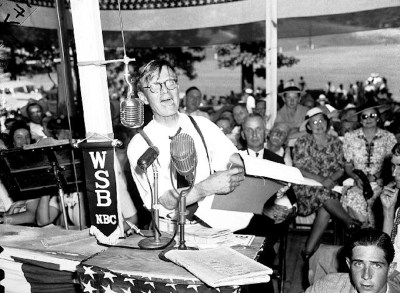Dear readers: Like it or not, it’s time for us to resume the exclusive, occasional coverage of politics in the US state of Georgia that Asia Times was offering in election year 2020.
Georgia is a long way from Asia, you might say – but try telling that to the enormous Asian diaspora communities in the Atlanta suburbs. Asia Times is an Asia-based and Asia-focused digital newspaper, yes, but we do not neglect the farther reaches of the planet.
Which brings me to one fascinating sidelight of the latest round of criminal charges against Donald Trump by the Fulton County, Georgia, prosecutor: If Trump is convicted, not only can he not pardon himself but he can’t demand that the Republican governor pardon him.
What’s the background of that? Here’s part of what the website of the state’s Board of Pardons and Paroles has to say, very gingerly:
In the early 1940s there were serious questions raised about the handling of pardons by some governors’ offices.
Careful readers of Asia Times may recall that you know something about those 1940s “serious questions.”

As I reported for Asia Times on December 11, 2020, in an article entitled “The Devil went down to Georgia: From Judge Hawkins’s Sunday School class to a purple, less Trumpish Georgia”:
When I was growing up in the 1950s in my home town, Marietta, there were still hardly any signs of Republicans.
Local Democrats were said to be divided, though, between the regular Democrats – the Talmadge faction – and a more moderate faction centered on State Supreme Court Justice J Harold Hawkins.
The Hawkins dislike of the Talmadge faction was cemented in the early 1940s when Governor Eugene Talmadge pardoned a convicted murderer at whose lengthy Superior Court trial Hawkins as a Superior Court judge had presided.
Like others, Hawkins believed that Talmadge, who was unabashedly corrupt, had taken a bribe from the killer’s influential father. In a biography, Hawkins is quoted as having complained about “the amount of effort to bring murderers to justice only to have them pardoned by a corrupt governor.”
Helping to establish its upright, straight-arrow image, the Hawkins faction in Marietta was better known, at least to some of us who attended the church, as the First Baptist Party. Hawkins was himself the church’s Sunday school superintendent and conducted a men’s “class” just across Church Street on the premises of a gas station, closed on Sundays, where the guys stood around, drank Cokes and smoked cigars while they plotted political moves.
My dad, a church deacon and cigar smoker, could sometimes be found among the group. I encountered them myself whenever a couple of friends and I left Sunday school and sneaked over to the Marietta Square to emulate them by buying our own cigars at Dunaway Drug Store.
Judge Hawkins died in June 1961 as I finished my freshman year away in college. Some part, at least, of the First Baptist faction came under the sway of an extreme social conservative, kitchen cabinet company owner Barney P Nunn.
But the judge and his forces long since had backed and seen to completion a major (and some of us would say positive) change in state law. Here’s more from the Board of Pardons and Paroles:
Public concern led the General Assembly to enact legislation, signed into law in February 1943, which created the State Board of Pardons and Paroles as an independent agency to administer executive clemency.
In August 1943 Georgia voters ratified, by a ratio of four and a half to one, a landmark amendment to the State Constitution. It established in that document the Parole Board’s authority to grant paroles, pardons, and reprieves, to commute sentences, including death sentences, to remit sentences, and to remove disabilities imposed by law. It was given a staff of parole officers to investigate cases and supervise persons granted parole.
The Constitution provided that the Governor would appoint the Board members to seven-year terms subject to confirmation by the State Senate. Once confirmed, members would be insulated from political pressures by the fact that no one official could remove them from office until they completed their terms. Their autonomy was enhanced by their right to elect their own chairman annually.
Now you know about that. Stay tuned for more news, background and analysis from the Peach State.
Asia Times Associate Editor Bradley Martin grew up in Marietta, Georgia. While attending Atlanta’s Emory University Law School in the 1960s, he worked in the election campaigns of US Representative James A Mackay and Atlanta Mayor Maynard Jackson.

